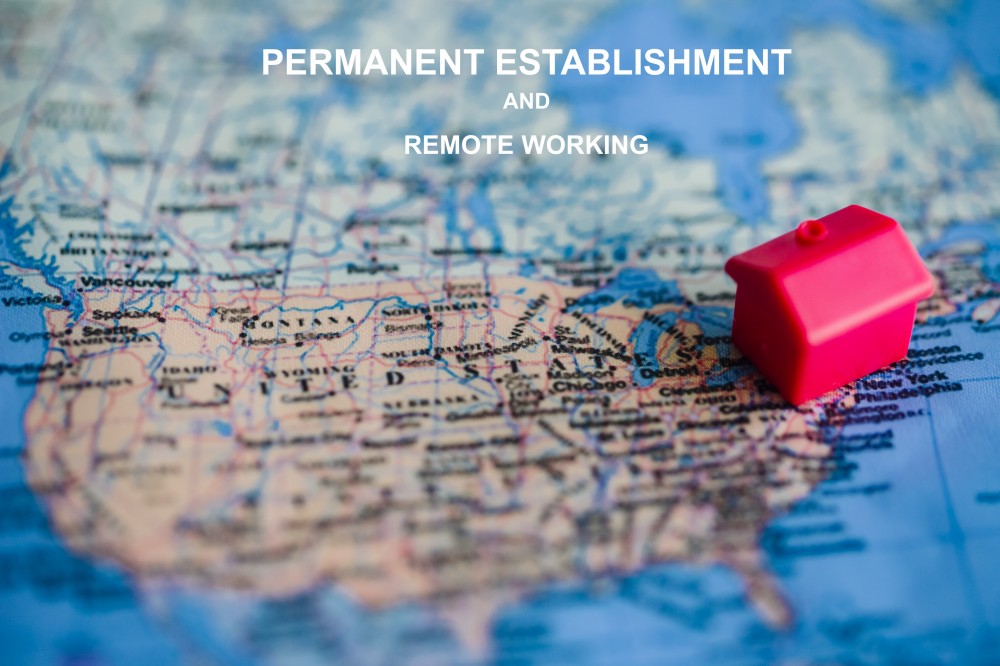PERMANENT ESTABLISHMENT
Inserted by Hooman Banihashemi
PERMANENT ESTABLISHMENT
Can an employee working remotely create a Permanent Establishment for a foreign employer?
The definition of Permanent Establishment (PE) can be found, among other sources, in double taxation treaties, where it is most often regulated by Article 5 of the convention — the full text is provided below. This article, like other regulations on the matter, does not explicitly address the issue of employees working remotely from a country different from that of their employer. A typical example is the presence of remote workers in Italy who are employed by a U.S.-based company. Article 5 considers, for the purpose of determining a Permanent Establishment, the existence of “a fixed place of business through which the business of the enterprise is wholly or partly carried on.” Therefore, for a PE to exist, the business must have at its disposal a permanent location where its activity is conducted.
To understand whether the presence of remote employees working for a foreign employer can constitute a Permanent Establishment, one must analyze paragraphs 18 and 19 of the OECD Commentary on Article 5.
Paragraph 18 of the OECD Commentary refers to activities that, if carried out continuously in a given place by a person — even their private residence — may cause that location to be considered at the disposal of the enterprise, thus qualifying it as a place of business.
Therefore, sporadic or non-continuous work performed from the employee’s home may lead to the conclusion that such a location is not at the disposal of the enterprise, and thus a Permanent Establishment would not be created. However, this assessment must be complemented by paragraph 19.
Paragraph 19 of the same commentary emphasizes a key aspect: whether it is the enterprise that requires the employee to work from home.
To avoid the existence of a hidden (or de facto) Permanent Establishment, according to the OECD Commentary, the following conditions should be met:
A) Working from home should not be mandated by the company, but rather be the result of the employee’s personal choice, agreed upon by both parties. For instance, if a company mandates remote work due to the absence of physical offices — possibly to reduce rental costs — then remote work is driven by the needs of the enterprise.
It is important for the company to maintain an operational workspace (a desk, an office) for the employee at its foreign premises and continue conducting its core business from offices located in its home country.
B) The employee working from home must not engage in the company’s core business activities. Therefore, the tasks performed by the remote employee should be auxiliary in nature.
⚠️ It is important not to confuse a regular employee working remotely from home with a Legal Representative doing the same. In certain cases, the activity carried out by a company director can indeed give rise to a Permanent Establishment (see Italian Supreme Court ruling No. 1977/2020) and may also trigger issues related to artificial transfer of corporate residence abroad (fictitious foreign residency).
These concepts were also affirmed by the Italian Tax Authority in Circular No. 25/E of August 18, 2023, which provides an analysis based on Articles 7 and 14 of the OECD conventions, both of which consider the notion of a “fixed base” for the enterprise.
Each case should be analyzed in detail, assessing how the remote work is actually carried out and how both the enterprise and the employee behave in practice.
Given that remote work and the emergence of the "digital nomad" arose primarily following the COVID-19 pandemic, many related tax aspects have yet to be specifically addressed or regulated by tailored legislation.
Here are some important rules to follow to avoid being considered a Permanent Establishment:
- Working from home must be the employee's choice. Ideally, this should be formalized in a written agreement in which the company explicitly states that the employee is free to work remotely from any location of their choosing, clarifying that the location selected by the employee is not at the company’s disposal;
- The employee must not carry out core business activities from the location where they work remotely;
- The employee should instead carry out auxiliary activities;
- The company should have operational offices in its home country and maintain a designated workspace for the employee within the company’s premises;
- The employee must not have the authority to sign contracts on behalf of the company from the country where they are working remotely (only limited authority such as purchasing goods may be acceptable).
It is important to emphasize that these guidelines are based on interpretations of existing regulations — there is no single law or provision that lays out, in detail, what must or must not be done. Therefore, beyond the points listed above, the actual behavior of both the company and the employee in their day-to-day operations plays a critical role.
Prof. Dott. Hooman Banihashemi
Article 5 – Permanent Establishment
- For the purposes of this Convention, the term “permanent establishment” means a fixed place of business through which the business of an enterprise is wholly or partly carried on.
- The term “permanent establishment” includes especially:
a) a place of management;
b) a branch;
c) an office;
d) a workshop;
e) a laboratory;
f) a mine, an oil or gas well, a quarry or any other place of extraction of natural resources;
g) a building site or construction or installation project that lasts more than twelve months.
3. Notwithstanding the preceding provisions, the term “permanent establishment” shall not be deemed to include:
a) the use of facilities solely for the purpose of storage, display, or delivery of goods or merchandise belonging to the enterprise;
b) the maintenance of a stock of goods or merchandise belonging to the enterprise solely for the purpose of storage, display, or delivery;
c) the maintenance of a stock of goods or merchandise belonging to the enterprise solely for the purpose of processing by another enterprise;
d) the maintenance of a fixed place of business solely for the purpose of purchasing goods or merchandise or of collecting information for the enterprise;
e) the maintenance of a fixed place of business solely for the purpose of carrying on, for the enterprise, advertising, supplying information, scientific research, or similar activities which have a preparatory or auxiliary character.
4.Notwithstanding the provisions of paragraphs 1 and 2, where a person — other than an agent of an independent status to whom paragraph 5 applies — is acting on behalf of an enterprise and has, and habitually exercises, in a Contracting State an authority to conclude contracts in the name of the enterprise, that enterprise shall be deemed to have a permanent establishment in that State in respect of any activities which that person undertakes for the enterprise, unless the activities of such person are limited to those mentioned in paragraph 3 and, if exercised through a fixed place of business, would not make this place a permanent establishment under the provisions of that paragraph.
5.An enterprise of a Contracting State shall not be deemed to have a permanent establishment in the other Contracting State merely because it carries on business in that other State through a broker, general commission agent, or any other agent of an independent status, provided that such persons are acting in the ordinary course of their business.
6.The fact that a company which is a resident of a Contracting State controls or is controlled by a company which is a resident of the other Contracting State, or which carries on business in that other State (whether through a permanent establishment or otherwise), shall not of itself constitute either company a permanent establishment of the other.




